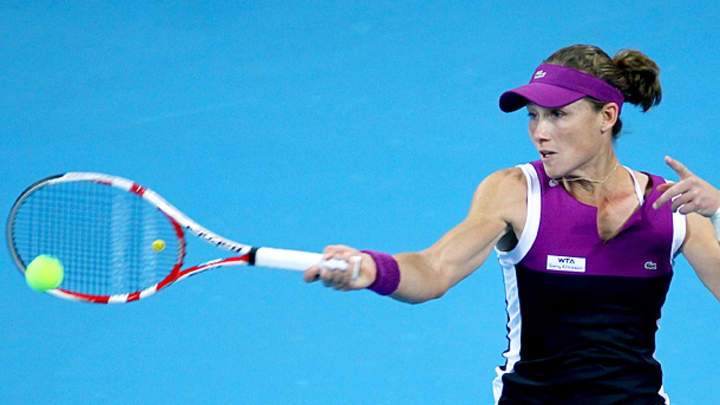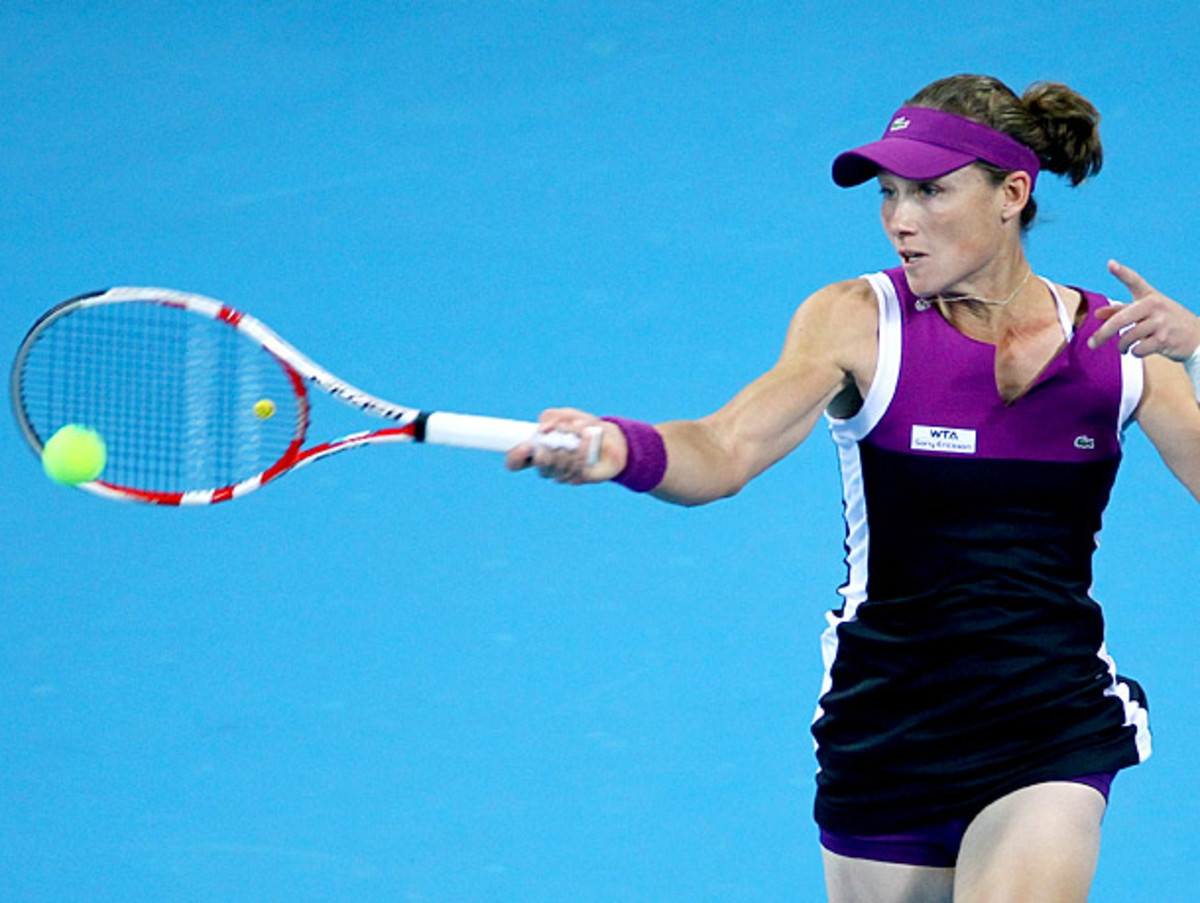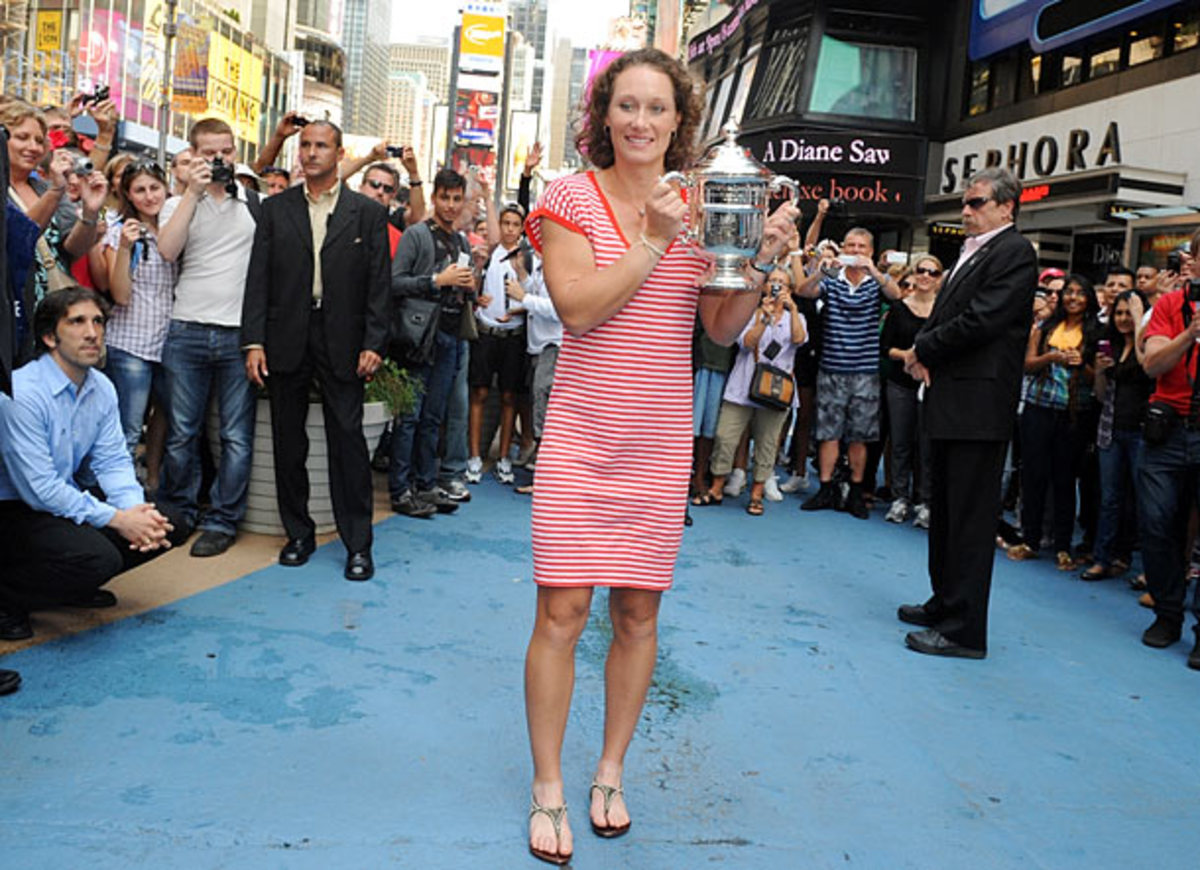Q&A: Stosur talks Slams, schedules, stamps


U.S. Open champ Sam Stosur is the No. 6 seed at this week's China Open. (ZUMAPRESS.com)
Samantha Stosur stunned Serena Williams at the U.S. Open last month to win her first Grand Slam title. After a tough second-round loss to Maria Kirilenko last week in Tokyo in her first match since New York, the 27-year-old Aussie is back in action this week as the No. 6 seed at the China Open. After defeating Tsvetana Pironkova on Sunday, Stosur spoke with SI.com about her triumphant return to Australia and the increased pressure from being a major winner. She also discussed her goals for the rest of the season, the grind of the long tennis calendar and her involvement with USANA Health Sciences, the official health supplement supplier of the WTA Tour.
SI.com: The last time we spoke was the day after your win at the U.S. Open. You've now been back to Australia. How was the trip back?
Stosur: It was pretty cool. It was quite tiring but at the same time it was a few days I was really able to enjoy. I mean, it's all part of it, isn't it? You want to be able to celebrate and be with the people you want to be with. And then I was fortunate the Gold Coast gave me the keys to the city and there was a big parade. That's definitely something that doesn't happen every day, so it was great to be able to get back home and enjoy it for those few days. Then, obviously, I was on the next flight to Tokyo pretty quickly afterward.
SI.com: That's a long flight back to Australia from the States. I'm sure you're probably thinking, "What exactly am I getting myself into when I get off the plane"? Was it overwhelming? Surprising? What was your overall takeaway?
Stosur: The most overwhelming experience was probably the next day [after the U.S. Open final], going into Times Square and holding the trophy. It just kind of really hit me. That was the most crazy moment. But then getting back home off the plane and going straight into a press conference and a bunch of interviews after the flight and all that, it was definitely an eye-opener to what some of the players have gone through in the past. It was great that everyone was so excited, so interested and keen to know everything about it. It was a great experience. I don't know if it was what I expected or not expected because I never really thought about it, but however it ended, it was fantastic.

Sam Stosur was overwhelmed by the experience of posing with the U.S. Open trophy at New York's Times Square. (Louis Lanzano/AP)
SI.com: Did you hear from some of the other players during that time?
Stosur: Yeah, a bunch of players either sent me an email or a text message. One of the best things you can receive after winning a tournament is receiving congratulations from your peers that you play against every single week. And since coming to Tokyo and Beijing I think every person has said "well done" and they were so happy for me.
SI.com: You said after winning the U.S. Open that you had achieved your goal. So how difficult is it for you now to reassess your goals?
Stosur: I definitely have to do that, but first and foremost I wanted to get to Tokyo and try to have a good tournament. Unfortunately, that didn't quite happen. So then it was, Come to Beijing and try to have a good tournament [laughter]. It's really just trying to get back out on the court and play well and keep trying to improve. I think I struggled last week with wanting everything to be perfect and the same as it was in New York. I didn't get that feeling and I probably was overreacting a little too much. So this week I've really tried to enjoy myself on the court, try to relax and really enjoy this moment. It's a great time of my career. I don't think it's something that I need to get caught up about if I didn't feel exactly perfect out there. It's just to go out there and compete hard and keep trying to get good results.
SI.com: Is that just "the curse of success," that once you've tasted it and you know how well you can play that every time you step out there you expect the same level and it adds to the pressure you put on yourself?
Stosur: Exactly right, I couldn't say it any better [laughter]. For sure, I think that's the case and that's why we've seen players in my position have these great results and win a Slam and then struggle afterward. It's all part of it. Like I said, I came here and wanted this perfect feeling, I wanted it to be just like it was in New York. And when it's not like that, it's disappointing because you know how good you can play and how badly you want it to keep going. But you're in a totally different country, different tournament, you can't always expect it to be that way. It's definitely a mental thing to be able to handle that success the right way and understand that you don't have to play well enough to win a Grand Slam every single day you're on the court.
SI.com: Players like Petra Kvitova and Li Na, they went through and are going through a bit of slump. As we know, the Tour keeps moving and there's little time to adjust. Is there almost a sense that you don't have time to rejigger your mind to figure out how to go forward?
Stosur: In some ways, yeah. Sometimes it's easy to get to this Asian swing, and I'm sure everyone's feeling a little bit tired, everyone's a bit mentally fatigued, physically fatigued as well, so I think it's true that during this period you see some funky results. I came off that great win, I think it'd be great now -- I know there are only a few tournaments left -- to really try to knuckle down and do my best. You don't have to go out and win every tournament but to at least be playing the right way and to have that good attitude and to mentally handle the situation is what my goal will be for the next few weeks. There's not long to go, so it is a matter of knuckling down and realizing that and not jumping to conclusions. Someone like Li Na won the French and now she's struggled for the rest of the season. I don't have that long to go. I don't want it to end badly.
SI.com: Speaking of the Asian swing, the season for most players revolves around peaking and preparing for the Slams. At this point of the season, that's not the case. How difficult is it for players to motivate for this last push?
Stosur: For sure, you feel like the year is almost over. There's a little bit left to go. There is a big tournament in the Championships if you qualify and it's fantastic if you're able to get there. But it's a different lead-up, I guess you could say. The last few years I haven't had a good finish to the year. My Asian swings have been terrible. Coming here this year, I have to really try to change that and try to learn from what's happened the last couple of years and be able to bounce back from that. And now coming off the U.S. Open win, that's a whole new scenario as well. If I can at least improve from my last two years over here, then that would be a good start.
SI.com: There's been a lot of talk over the last three weeks about the length of season, particularly among the guys. Where do you fall in that argument and what's your take on how long the tennis season is?
Stosur: No doubt it's long. It's probably one of the longest seasons we have in sport. Having said that, if you make the Championships, you're done Oct. 31 or Nov. 1, whatever it is. That gives you two or three weeks where you can totally take a break, have a holiday, do whatever you want, and then still have four or five weeks for a preseason. I mean, four or five weeks is a pretty long time to be out on the court or be out on the training track. So I don't see it as a big deal anymore. I think it's improved a hell of a lot. If you make a good schedule, you can definitely set breaks throughout the year to take a break, to rest, to train. It's all about being smart and playing the tournaments that you should play. We all know how long the season is so if you work it out the right way you should be able to get through it. But having said that, I think the men's calendar is way too long. I think they're still playing four weeks after us, which is a bit ridiculous.
SI.com: So, given the length of the tennis season, how do you stay fit throughout the year? You guys are on planes all the time, jumping from city to city, re-acclimating yourselves, jet lag.
Stosur:I am one of the ambassadors for USANA, and I have to say, since they've come on board with the Tour, I've been able to take those vitamins knowing that they are going to be safe. That's one thing I never wanted to do before they had a company like USANA, because I was too worried that something was going to be contaminated or wondering if it was safe. But being able to take them, I definitely don't get colds as much anymore, I don't get sick as much. Being on planes and traveling around and getting run down, you're definitely more susceptible to picking up the odd virus or the odd cold. I definitely take their products and try to keep my immune system as good as it can be because I've had my health issues in the past and now it's a really important thing for me to not get run down.
SI.com: Your website posted pictures of the stamps that are being issued with your face on them. How weird is that for you to see?
Stosur:
That'll be pretty cool, I think. I think I'll have to go out and buy a couple of my own stamps [laughter]. I know Australia has done it in the past with the gold-medal winners, so to have that of myself is pretty cool. Maybe I can post a few letters.
